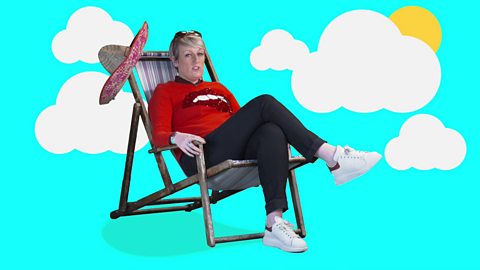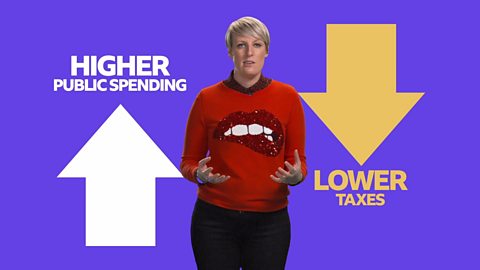Steph McGovern: I really wanna buy a car but I don’t have enough cash. So I wonder if someone will lend me some money. I mean I could ask my family or a friend or maybe a bank or a building society might help. But if I borrow money from them they’ll want something back in return. It’s called interest.
Steph McGovern: It's extra money you pay on top of the loan and it’s normally a percentage of what you’ve borrowed. Now it might be 1% per year or 20%. For some loans it can even be as much as 1000%. Now it all depends on how much you want to borrow, how long it will take you to pay it back and whether the lender thinks you can afford it.
Steph McGovern: If you have a stable job and don’t owe lots of money already, you can borrow quite easily. It gets harder and more expensive if you don’t have a regular income and you’ve had money problems in the past.
Steph McGovern: There are loads of different ways to borrow money. Sometimes the banks will let you take out more cash then you’ve put in, that’s called an overdraft. It might be free to start with but if you don’t pay it off quickly they can start charging you for it.
Steph McGovern: There are also things called credit cards which let you buy stuff, then at the end of the month you pay back what you’ve spent. So if you pay it back in full every month you're borrowing money for free. But if not, they will charge you and the longer you leave it to pay back the more expensive it is. Also there are rules, so you can’t get a loan or a credit card if you’re under 18.
Steph McGovern: Now often the first time a young person will need to get a loan is to go to university. So they need cash for things like accommodation and food. So the government lends student money, thank you, to cover university fees and some of their living expenses. But these loans are special because you only have to start paying them back when the money you’re earning from your job after uni goes above a certain amount. So some people might never pay it back.
Steph McGovern: One of the biggest loans you’re ever likely to need is to buy a house. Now they cost hundreds of thousands of pounds and not many people would have that kind of money saved up, so they get a loan called a mortgage. These loans can take years and years to pay back, normally about 25 years - so it’s a big commitment.
Steph McGovern: Now if you stop paying the bank the money you owe each month, if they want to they can kick you out of the house then sell it and use the money to pay off your loan, so it’s really important to work out whether you can actually afford to buy a house before you do.
Steph McGovern: The interest on a mortgage is normally quite low compared to other types of loans. So let’s say you borrowed £150,000 for 25 years you would pay back around £711 a month. That means in total you are paying back around £213,000 for that £150,000 you borrowed.
Steph McGovern: Some of the most expensive loans are from companies called payday lenders. Now the people who normally get money from these types of places are those who struggle to borrow elsewhere. Sometimes their interest rates can be as high as 1000% a year. So you might start out borrowing a ÂŁ100, and end up paying a grand back.
Steph McGovern: Now before any business lends you money they want to work out how likely you are to pay your loan back. So they’ll do checks on you to work to see if you’ve taken out a loan before and whether you’ve paid it back on time. So with any borrowing you need to have a plan of how you’re going to pay it back otherwise your debts could spiral out of control.
Video summary
Steph McGovern covers everything you need to know about credit and debt after leaving school.
When you borrow money from a bank or building society, they charge interest, money you pay back on top of what you've borrowed. What it costs depends on the interest rate and how long you take to pay back your debt.
There are other forms of borrowing too; overdrafts, credit cards, student loans and mortgages. 'Payday' loans, the most risky kind of borrowing, can have sky-high interest rates.
Lenders check your payment history, to see if you'll be able to pay the money back. So, if you need a loan, make sure you have a plan for how to repay it.
Teacher Notes
Choose from a selection of activities to help students learn more about credit and debt.
Before watching
Questions to get the class thinking and talking…
- What is a debt?
- What is credit?
- What should you consider before borrowing money?
Establish 'debt' is money you owe and 'credit' money you borrow. Before you borrow money, you should know how much you'll have to pay back, how you'll afford it and when you'll have to do it.
Using the film
As they watch, ask the students to choose 'the single most important fact' from the clip. After viewing, gather the students' varying responses, to form an instant summary of the key points._
Watch the clip again, with the sound muted. Challenge your students to supply an alternate commentary, putting into their own words the points made by the silent Steph McGovern. Fade up the sound now and then, so your students can check if they are correct.
After watching
Role-play - Ask the students why they might 'ask for credit' (apply for a loan). The class could list reasons. Point out store cards and mobile phone contracts are credit agreements.
Invite several students to play the role of someone approaching a bank to borrow ÂŁ1,000. (You will take the role of bank manager!)
Interview each applicant, asking questions such as:
- Why do you need this loan?
- Have you considered the alternatives?
- Are you employed?
- What is your monthly income?
- What are your outgoings?
- How long a period do you want the loan to run?
- What is your credit history like?
- Can you supply documents to support your application? (e.g. bank statements, payslips).
Activity ideas
- Glossaries - Students could compile glossaries of financial terms used in the film clip, along with their own definitions. This encourages them to clarify their understanding of key vocabulary.
Terms might include: 'credit', 'debt', 'interest', 'interest rate', 'Annual Percentage Rate (APR)', 'overdraft', 'mortgage', 'loan', 'student loan', 'payday loan' and 'credit check'.
- Missing word puzzles - On the blackboard or onscreen, display the following paragraph, with the words in brackets missing. Ask students to fill the gaps.
An overdraft is [short-term] borrowing, best used for [emergencies]. The [bank] charges [interest] AND a daily, weekly or monthly [fee]. Spend more than you have in the bank [without] their [permission] and this [unauthorised] overdraft will [cost] you a LOT more. If you're about to go [overdrawn], talk to your bank and [agree] a [cheaper] authorised overdraft.
Ask students to devise similar missing-word puzzles about other forms of borrowing.
- APRs - Working in pairs, students could use an online loan repayment calculator to explore borrowing ÂŁ100 at a range of different APRs. For each APR, they should note the length or 'term' of the loan, the monthly payment, total interest and total amount repayable.
Point out that, even if the APR and monthly payments seem low, when a loan runs for a long time it ends up costing a lot to borrow a little.
Invite each pair of students to draw leaflets advertising three loans from their imaginary bank. Each loan has a different APR and a different term. Their classmates must try to spot the best deal (the one that will cost them the least in the end) for borrowing ÂŁ100.
- Alternatives - Ask the question 'are there alternatives to borrowing money?' The class could list suggestions, such as: 'save up, wait until you've been paid, cut back on other spending, do some overtime, sell something to raise the cash, choose a cheaper item, or consider if you really need to buy something at all.'
Supported learning and SEN
Students could (with any necessary support) take a screen-grab from Steph McGovern's film and add their own speech bubble, e.g. 'tell the bank before you go overdrawn'. A collection of 'Steph Says' captures and captions could form a financial education comic strip.
Closing the lesson
Ask students to try out their missing-word puzzles on the class.
This is a fun and snappy way to revisit the lesson material, reinforce the learning and check the students' understanding.
Follow-up task
Ask the class to research online the differences between credit and debit cards. Students could draw up a table comparing the two types of card.
This short film meets and extends curriculum requirements for financial literacy at:
- Key Stage 3 and Key Stage 4 in England (Citizenship and Personal, Social, Health and Economic Education)
- Wales (Mathematical Development and Personal and Social Education)
- Northern Ireland (Mathematics and Numeracy and Learning For Life and Work)
- Third and Fourth Level and the Senior Phase in Scotland (Mathematics and Numeracy, Social Studies and Learning, Life and Work).
Pensions: Where do you get money from when you stop working? video
In about 50 years you can retire, but you'll need money - that comes from a pension. The sooner you start saving for one the easier it is, says Steph McGovern.

Interest: How does compound interest work? video
If you borrow money, you will usually have to pay back more than you borrow. Steph McGovern explains why both debts and savings keep on getting bigger.

Tax: Who pays for schools and hospitals? video
A guide to how governments collect taxes to pay for schools, hospitals, the police, the army and other public services.
